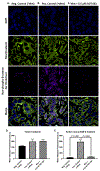Suppression of Colon Tumorigenesis in Mutant Apc Mice by a Novel PDE10 Inhibitor that Reduces Oncogenic β-Catenin
- PMID: 34584001
- PMCID: PMC8916418
- DOI: 10.1158/1940-6207.CAPR-21-0208
Suppression of Colon Tumorigenesis in Mutant Apc Mice by a Novel PDE10 Inhibitor that Reduces Oncogenic β-Catenin
Abstract
Previous studies have reported that phosphodiesterase 10A (PDE10) is overexpressed in colon epithelium during early stages of colon tumorigenesis and essential for colon cancer cell growth. Here we describe a novel non-COX inhibitory derivative of the anti-inflammatory drug, sulindac, with selective PDE10 inhibitory activity, ADT 061. ADT 061 potently inhibited the growth of colon cancer cells expressing high levels of PDE10, but not normal colonocytes that do not express PDE10. The concentration range by which ADT 061 inhibited colon cancer cell growth was identical to concentrations that inhibit recombinant PDE10. ADT 061 inhibited PDE10 by a competitive mechanism and did not affect the activity of other PDE isozymes at concentrations that inhibit colon cancer cell growth. Treatment of colon cancer cells with ADT 061 activated cGMP/PKG signaling, induced phosphorylation of oncogenic β-catenin, inhibited Wnt-induced nuclear translocation of β-catenin, and suppressed TCF/LEF transcription at concentrations that inhibit cancer cell growth. Oral administration of ADT 061 resulted in high concentrations in the colon mucosa and significantly suppressed the formation of colon adenomas in the Apc+/min-FCCC mouse model of colorectal cancer without discernable toxicity. These results support the development of ADT 061 for the treatment or prevention of adenomas in individuals at risk of developing colorectal cancer. PREVENTION RELEVANCE: PDE10 is overexpressed in colon tumors whereby inhibition activates cGMP/PKG signaling and suppresses Wnt/β-catenin transcription to selectively induce apoptosis of colon cancer cells. ADT 061 is a novel PDE10 inhibitor that shows promising cancer chemopreventive activity and tolerance in a mouse model of colon cancer.
©2021 American Association for Cancer Research.
Conflict of interest statement
Disclosure of Potential Conflicts of Interest:
G.A. Piazza, A.B. Keeton, and X. Chen are co-founders of ADT Pharmaceuticals Inc. and consultants.
Figures






References
-
- Chan TA. Nonsteroidal anti-inflammatory drugs, apoptosis, and colon-cancer chemoprevention. Lancet Oncol. 2002;3:166–74. - PubMed
-
- Alberts DS, Hixson L, Ahnen D, Bogert C, Einspahr J, Paranka N, et al. Do NSAIDs exert their colon cancer chemoprevention activities through the inhibition of mucosal prostaglandin synthetase? J Cell Biochem Suppl. 1995;22:18–23. - PubMed
-
- Piazza GA, Alberts DS, Hixson LJ, Paranka NS, Li H, Finn T, et al. Sulindac Sulfone Inhibits Azoxymethane-induced Colon Carcinogenesis in Rats without Reducing Prostaglandin Levels. Cancer Res. 1997;57:2909–15. - PubMed
-
- Beazer-Barclay Y, Levy DB, Moser AR, Dove WF, Hamilton SR, Vogelstein B, et al. SHORT COMMUNICATION: Sulindac suppresses tumorigenesis in the Min mouse. Carcinogenesis. 1996;17:1757–60. - PubMed
Publication types
MeSH terms
Substances
Grants and funding
LinkOut - more resources
Full Text Sources

